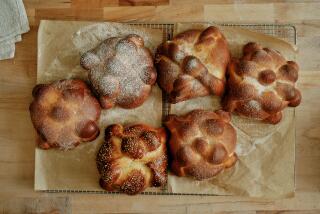In Texas Hill Country, kolaches hit sweet spot of a Czech tradition
- Share via
Smoked beef brisket, a fiery bowl of chili and sweet-as-molasses pecan pie — all iconic Texas foods I couldn’t wait to try during a fall visit to the Lone Star State.
But Czech pastries? Those were new — to me, but not to Texas.
They’re called kolaches (pronounced ko-LAH-chees), and you can find them at bakeries in Texas Hill Country, an area that begins around Austin, stretches south to San Antonio and about 100 miles west.
Kolaches may not be as common as chicken-fried steak and Dr Pepper, but they’re gaining ground. The Kolache Factory (www.kolachefactory.com) has more than 40 stores, including one in Orange County’s Tustin.
But the real hot spot for these grab-and-go pastries is the Czech Belt, a swath of countryside in central and southern Texas that was settled in the mid- to late 19th century by immigrants from what’s now the Czech Republic. When they arrived from Europe, they brought with them their recipes for traditional foods: sausages, potatoes and sauerkraut; noodles; dumplings; and such baked goods as strudels and kolaches. Their native foods became part of Texas’ culinary tradition.
Although recipes differ, kolaches are basically round pastries created with dense, mildly sweet yeast dough that is filled with fruit, cheese or other ingredients before being baked. Extensive tasting during my trip led me to give my personal edge to apple.
Baker Heith Treadwell has been making them for 10 years at Austin’s Kolache Creations (www.kolachecreations.net), “and eating them for 37,” he said with a laugh.
“Traditionally, they were made with cottage cheese, prunes and poppy seeds,” Treadwell said. “But tastes change.”
The big seller at the bakery now — “and the best kolache in Texas,” he boasted — is jalapeño, sausage and cheese. The store also sells standards such as cherry, apple, peach and other fruits, plus combinations of sausage, ham, cheese and eggs.
“Like everybody else, we try new things all the time,” Treadwell said. “Sometimes it backfires. We tried a spinach pesto that looked great, and we couldn’t give them away.” Prices range from 99 cents to $2.24 per pastry.
At Little Gretel (www.littlegretel.com), a popular Czech-German restaurant in Boerne, about 100 miles southwest of Austin, owner Denise Mazal serves standard kolaches filled with wurst or various fruits, but she also has added a Kolache Benedict to the menu, which is served with “peach and cheese kolaches on the side.” That’s a lot of kolaches at one meal, but if you’re a fan you’ll probably love it.
Most of the bakeries I visited were down-home, mom-and-pop-style operations, but not the Kolache Factory store I found in San Antonio. Everything was shiny and bright, sort of a McDonald’s with pastries. Besides selling the standard kolache varieties, it had some unusual flavors, such as chicken enchilada ranchero ($2.50).
I think I’ll stick with apple.
More to Read
Sign up for The Wild
We’ll help you find the best places to hike, bike and run, as well as the perfect silent spots for meditation and yoga.
You may occasionally receive promotional content from the Los Angeles Times.






